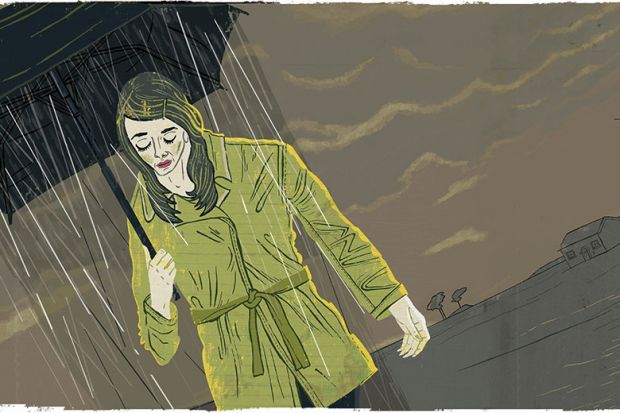I am a working-class academic. That is true at the time of writing but it may not be by the time you read this, as I am currently “at risk of redundancy”. Unless something sensible happens, my career could shortly be over. And if that transpires, I will certainly feel a deep sense of personal failure. But I will mostly be angry at the institutional and structural problems that caused this situation.
I was the first in my family to go into higher education. My parents were manual workers: my mum – a Romany Gypsy – had been a cook in domestic service and my dad was a boiler stoker in local army camps. They did not understand my secondary school homework, so could not help me with it. And, of course, we had very few books or educational trips. In careers lessons at school, I was asked if I would prefer to work in a shop or a factory. So I left school at 15 and, like the rest of my family, took up manual work in a range of jobs: shopworker, postwoman and factory worker, among other occupations.
When I was 23, I saw an advert for my local college offering grants to “mature students”, so I took A levels there. One of the teachers encouraged me to continue to higher education, so I enrolled at a London polytechnic. I received no careers advice about where else I might have studied, and after I graduated I did not have the confidence to apply for a professional job. Although, by now, I knew some middle-class people who had these jobs, I assumed they were superior to me – I did not think I could do the same. So I went back to manual work, as a motorcycle courier.
However, because I was always very active in my local community, I eventually met a professional community worker. I had not realised previously that you can do community work for a living, but the idea strongly appealed, so I went back to polytechnic to do a diploma in youth and community work. The boost it gave to my confidence was such that, at the age of 35, I started my first professional job.
About 15 years later, however, community work was being transformed and diminished. For this and other reasons, I went to university to do a master’s and then a PhD. It was an elite university, but I chose it because it was close to where I lived.
I finished my PhD without corrections, which had rarely happened in the department before. But although I’d done well academically, I’d had no guidance about how to pursue an academic career. So I accepted whatever short-term, part-time academic contracts I could find – some of which lasted for just two weeks, or offered only a few hours a week. These earned me just £4,000 in the entire first year, yet, despite living well below the poverty line, I could not claim state benefits because the hourly pay was quite high: I just did not have enough hours.

I tried to get other work, signing on to agencies to do washing-up or office work, but they all said I was overqualified. I made some extra money proof-reading and, at one point, renting out my bedroom while I slept on the floor downstairs. My house was badly in need of repairs, as it had been throughout my PhD, but I could not afford to have them done. Most worryingly, the chimney was loose and could, at any moment, have come crashing through the roof. It was very stressful to live in such unhealthy and dangerous conditions.
In spite of it all, when not proof-reading and doing casual academic jobs, I spent those first years publishing, writing funding bids and applying for jobs. But, although I was frequently invited for interview and given good feedback about my performance, I never got any of the positions I applied for. I went to the careers service at the university to try to understand how I could overcome this but they could not tell me. They said my written documents were great and so was my interview technique.
But when there were internal competitions for jobs or fellowships, my applications were always rejected on spurious grounds, such as my supposedly not having enough publications, when I had more than many of those who were put through to the selection committee. When this happened for the umpteenth time, I finally complained and my bid was put through for the first time. This gained me a three-year fellowship.
Before the bid came through, however, my working life had become very difficult. I went from under-employment to over-employment, juggling up to 10 small contracts at a time, stopping and starting with increasing regularity. After four years, university policy stipulated that I was entitled to be moved on to a more secure contract, but the only security that I gained was that the university now had to go through a redundancy procedure at the end of some of the contracts. This should also have given me the right to redeployment, and on two occasions it did yield more part-time, short-term work.
However, all the other interviews I had under redeployment were undertaken by principal investigators who wanted their posts advertised externally. As there were no other candidates in my redeployment interviews, the only way they could refuse me was to make very extreme statements about my incompetence. So they did. I was told that I was incapable of doing research in my key topic areas, even though I had been doing it successfully for years. This was a particularly upsetting aspect of the whole situation.
Another difficult aspect has been the bullying. Bullies are renowned for targeting precarious workers, especially those they consider weaker because of their gender, class or race. As part of my union activity, I have complained about casualisation. One professor felt very threatened by this and sent me a stream of hate mail, copied in to colleagues, calling me various names and denigrating my Romany Gypsy heritage. I went to see those charged with ensuring “acceptable behaviour” and there were a few meetings. But the professor refused to attend, and the university decided in the end not to take it further because he was feeling stressed. He also brought a lot of money into the department, but that was never mentioned.
Readers might think that my performance is poor in some way: that I do not publish or bring in funding or create impact, or that I am not a good colleague. That is not the case. Seven years after finishing my PhD, I have more than 60 publications, many in high-quality journals or with quality book presses. I have brought in hundreds of thousands of pounds in grants – often more than the professors who are denying me the jobs. My work has influenced government policy in a number of countries. I have never been disciplined and have always had excellent references from my various managers. And my work supporting my colleagues as a union representative over the past three years has been unpaid, since I am not core-funded.
Some will say that this is just the way academic careers are these days, and I agree that many early career researchers have had a difficult time in recent years. But I do think that my class is the main reason that my career might soon end.
First, the lack of confidence and role models that kept the prospect of an academic career out of my sights for so long counts against me because people expect you to be young when you apply for early career positions. Yet this is a common problem for people who come from groups that are marginalised or oppressed.
Second, my absence of any sense of entitlement or belonging to academia was what propelled me to accept jobs that were well below my capability and suboptimal for both my career and my budget. Getting my PhD without corrections boosted my confidence for a few months but the constant rejections made me ultimately doubt myself. Impostor syndrome is, of course, a common affliction, but it is worse for people from marginalised backgrounds. I felt privileged to be able to work in a university under any circumstance.
Third, because I had economic pressures, I did not always make the best decisions about which jobs to take. I know of middle-class people who went off on world tours after their PhDs, or took time out to write a few papers. I did not have that luxury. There was no one for me to turn to for financial help. I had to work the day after my PhD funding ended. So my CV seems excessively diverse to some employers and I have been refused jobs for that reason.
Fourth, I have not benefited from the close friendship networks in academia that could have given me informal advice about how to manage my career. I always felt intimidated around middle-class people as I had previously only ever known them as social workers, doctors, bank managers: people who controlled my life and could make decisions about me that I might not like. I have some middle-class friends outside academia and a few among fellow early career academics, but still virtually none among senior colleagues. Occasionally, a few senior academics have given me advice when I have requested a specific careers meeting, but because they are not my friends, I am not with them during the relaxed hours when the most honest advice is often passed on. I had so little in common with them, as they discussed holidays and their dilemmas about home improvements – whether to opt for a marble or granite worktop – while I wondered if I would ever get a day off and how I could hang on to my home. By contrast, I have made genuine friendships with the receptionists, cleaners and other working-class university staff. I feel sad when I see other academics treat them as if they do not exist.
Fifth, I do think that there has been some prejudice against me in interviews because I do not come across as middle class in terms of manners, speech and dress. I often come second in appointment competitions, and when I meet the other candidates, the successful one always oozes confidence, speaks with a middle-class accent and wears expensive-looking clothes.
Finally, the prolonged stress caused by the insecure work and the bullying impacted on my health, in particular, triggering a voice disorder linked to trauma called spasmodic dysphonia. I was left with a strangled voice and, for about a year, I could hardly speak at all. Now, almost four years on, it has improved substantially, but it still undermines my performance at interviews, as some interpret it as nervousness, illness or weirdness. Had I been middle class, I feel that more people within the academy would have defended me and recognised the harm that the bullying was causing. When middle-class people cannot pursue their careers for any reason, it is considered to be a tragedy, even if it is their own fault. But when a working-class person cannot pursue their career, we are just consoled with how well we did, “considering”.
At the time of writing, my fellowship, ironically called a Future Research Leader Fellowship, has about two months left to run, after which I face unemployment. My managers just casually tell me to keep making grant applications to avoid redundancy but they don’t understand that they are making me ineligible for most of the funding available by not giving me a secure and progressable contract. Moreover, I am not allowed to have pending grant applications that, if awarded, would account for more than 100 per cent of my time. So if I apply for a full-time grant, I have to wait for up to a year to find out if my bid is successful, and then, if it is not, I have to wait another year to hear about my next application. Alternatively, I could put in five bids at a time, each accounting for 20 per cent of my time, so as to have a better chance. But the chances of getting all five would be low, and I could end up working just a day a week.
My university could easily continue to employ me. It made a surplus of almost £50 million last year. But my departmental managers say that my research is not in their particular niche area. They say this even though I research sustainability and environmental issues. We are told that we have just 12 years to make the changes that will save us from catastrophic and irreversible climate change, and I am passionate about being part of the solution. I did not come into academia for my own status or wealth: I did it to try to make a difference in the world. I felt that academia would be the perfect place to do that. My university says that it wants to be in this market, and sustainability is in the senior management’s key strategy document. But they do not create the jobs that would provide the necessary expertise – and fail to require the departmental managers to do so.
Meanwhile, any number of the people that the university does core-fund, interested only in their own careers, have trodden on me and used my ideas and work for their own benefit. Quite a few of these were cruel and classist and racist. I am very disillusioned.
Universities could do more to mentor their staff from working-class backgrounds. They could also do more to understand how economic pressures shape our CVs and careers, and they could use their surpluses to create more secure contracts. They could take classist bullying seriously. They could develop class-based diversity and equality policies. They could review their current policies, such as redeployment, to make them less likely to cause harm. And they could recruit, retain and promote more working-class people as academics and managers, not just support staff.
Until they do, what could I say to a working-class person who was considering working or even just studying at university? Could I encourage them?
I wanted to succeed in part so that I could be a role model to them. But I have spent 10 very stressful years with a precarious income and, to date, seemingly no secure career at the end of it, while becoming overqualified and under-experienced for most other jobs. I have been bullied and harassed by wealthy and privileged people. Instead of being welcomed, my voice has been a problem in academia, and I have been silenced in every way. What kind of role model am I now? l
The author has chosen to remain anonymous. She is interested in starting a network of working-class academics in the UK, to offer mutual moral support. If you are interested, please send an email to wearewclass@gmail.com Note: Since this article was submitted and edited, the author has received and accepted a fixed-term job offer from another institution.
A bridge too far: is a degree the right path?
Studies of graduate destinations generally report positive outcomes for working-class graduates, particularly professionally validated programmes such as pharmacy or social work, which offer specific career pathways.
However, I know of working-class graduates with good degrees from good institutions who are in relatively menial positions in the leisure and retail sector. It is as if such students are unable to move beyond working-class jobs and embrace the middle-class careers that a degree should unlock.
This is not a new phenomenon. Brian Jackson and Dennis Marsden’s classic 1962 text Education and the Working Class illustrated that even working-class children educated at grammar schools still often ended up in traditional working-class jobs.
The reasons can be diverse, but as the late French sociologist Pierre Bourdieu suggested, they include a deficiency of cultural and social bridging capital, lower levels of self-assurance and commercial awareness, and very often an inability to enter or exploit the fertile professional networks that might boost confidence and alert them to employment options and opportunities. This leaves working-class graduates in ignorance of why they have not received even an acknowledgement of their application, let alone an invitation for interview.
My university, which has a lot of working-class students, scores well overall for graduate prospects and offers a rolling schedule of excellent programme-level careers advice and one-to-one support, both throughout the course and for many years beyond. We also have a mentoring programme, primarily to help students better understand the workplace and what is expected of them. Such schemes, common across the UK, are welcome as many students do not appreciate the importance of organising themselves and their CVs in their final year at university.
But while I strongly support widening participation initiatives, I also think that university applicants should be helped to think through their career aspirations and to consider whether a degree is really necessary. Higher-level apprenticeships, for example, are an alternative way of learning at university while accessing a professional qualification in areas such as business management, law, financial services, policing, engineering and IT.
With many apprentices remaining with their training employer, it would seem that for some working-class students, getting “one foot in the door” without having to study full-time for three years is a viable remedy for deficits in their social bridging and networking.
Carole Binns is a lecturer in criminal justice studies at the University of Bradford.
POSTSCRIPT:
Print headline: The end of my tether
Register to continue
Why register?
- Registration is free and only takes a moment
- Once registered, you can read 3 articles a month
- Sign up for our newsletter
Subscribe
Or subscribe for unlimited access to:
- Unlimited access to news, views, insights & reviews
- Digital editions
- Digital access to THE’s university and college rankings analysis
Already registered or a current subscriber?








